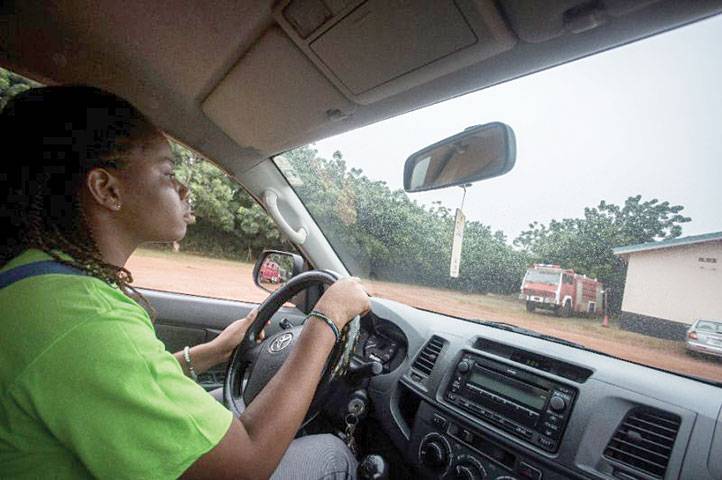ACCRA-Faith Lawson carefully backs a large silver pick-up truck through cones placed on the red soil of a military camp in Ghana’s capital, Accra.
As she checks her mirrors and slowly reverses, 14 young women standing in military formation look on.
Two months ago, the 24-year-old had never even gripped a steering wheel and was frightened by the very thought of driving.
Now she hopes to become a professional driver and break into a male-dominated vocation after completing a programme aimed at creating jobs and empowering women.
Lawson is one of 15 being trained as a driver on a course run by Ghanaian charity Network of Women in Growth (NEWIG), which works to draw women into more lucrative professions.
For eight weeks, the women learn the ins and outs of driving, from how to change a tyre to reading maps.
Ultimately, they hope to take the wheel as chauffeurs or commercial drivers and in the process overturn rigid gender stereotypes in the west African nation.
Fiawomorm Landzo-Wene comes from a small town on the Volta River, where women traditionally bake bread or sell food and fabric at busy market stands.
But at 21, she has a different dream. “I have been desiring to drive for so long and now the chance has come,” she said.
“Now looking at it I see that what men can do, women can do - and do it better.”
Mawusi Awity founded NEWIG in 2002 to help marginalised women break into the workforce, teaching them skills to make a living in areas such as textiles, beads or catering.
There is also education on domestic violence and family planning.
But this year Awity wanted to encourage women to get into better-paid professions - usually those more associated with men.
Encouraging women to drive would also be a service to society, said Awity.
“Statistically women are less involved in accidents. Men are more offensive on the roads and women defensive,” she said.
The Ghanaian army has partnered with the charity to make sure the new drivers operate on the roads with military discipline.
Clad in charcoal grey overalls embellished with pink accents, the students learn how to spot hazards on the road and train in first aid.
Awity is proud to report that the fear the women once had of driving has been “broken” and the training has made them “more confident and assertive”.
Ghana ranked 63 out of 145 countries on the World Economic Forum’s “Gender Gap Index” in 2015, with the country part of a group making “the largest absolute gains in senior roles”, including legislators, senior officials and management positions.
According to the United Nations 2015 Human Development Report, women in Ghana work more than men but are paid less because they are more involved in the informal sector.
Women’s estimated gross national income per capita was $3,200 (2,832 euros) in 2014, compared to men at $4,515 (3,995 euros).
Soon, some of the qualified drivers may even join the ranks of Esenam Nyador, one of the few female taxi drivers operating in Accra.
Nyador wanted to be a truck driver but for lack of training the 39-year-old decided to go into the taxi business. Three years later, she’s a minor celebrity on Accra’s streets.
In a demonstration of her business acumen, Nyador caters to well-heeled expatriate clients and has even dubbed her taxi the “UN car”.
The mother of two knows she’s setting an example and describes her work as “a gender statement”.
“I am daring the status quo and the gender relations that exist or govern society here in Ghana,” she said.
It’s a career path Landzo-Wene plans to emulate.
She has already mapped out her future, starting by driving a taxi, then a bus, and has an ultimate goal in mind.
“I know with my ambition I will surely drive the president,” she said.






